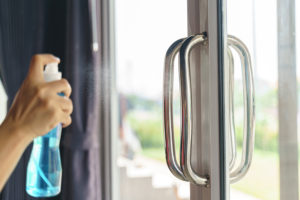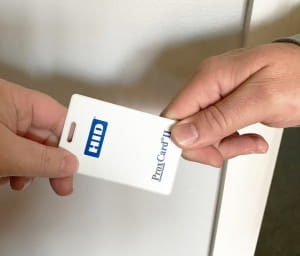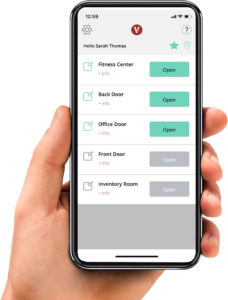Touchless Access Control Critical for Property Managers
So, how can property managers help residents feel more comfortable when entering common areas? A touchless access systems is the answer!
Doors in Common Areas Are Petri Dishes for Germs
Anywhere people congregate presents an opportunity for germs to spread and apartment buildings are no exception. How property managers and maintenance staff deal with common areas like pools, lobbies, and fitness clubs is critical. It is important to recognize those areas and have a plan for dealing with them.

Door Handles
The first place to start is door handles in common areas. They may be touched by hundreds of people each day and are prime suspects for spreading germs.
Temporary Options Aren’t Very Practical:
- Cleaning wipes at the door. Have hand cleaners or wipes on the “pull” side of the door. But, that relies on every user to take action and staff to ensure supplies are constantly refilled.
- Manually clean throughout the day. Posting someone at the door to sanitize the handles every time someone walks through is clearly too expensive. And even if you only clean the handles once/hour, that still requires an employee to do it and it isn’t clear to renters that the doors are being regularly cleaned. Most people would just rather not touch the door handle at all.
Touchless Access Options for Door Handles:
- Leave the door open. Can the door be left open during busy times to minimize contact? Keep in mind this will still require an employee to manually lock up when access times are over.
- Electric door openers. Can you install an electric door opener? If you have the budget, there are several electric door openers that can be opened with an app or motion sensor. These touchless door openers can be installed by a locksmith or even your maintenance staff. Check out an example of one here.

The good news is there are options for affordable products that don’t require residents or staff to touch anything unfamiliar.
- Keycards & Key FOBS: Proximity card readers don’t always require contact, but tenants often share keycards and FOBs, which is not ideal. These types of systems also require property managers to have residents come into the office to physically exchange the keycard or FOB, exposing yet more people.
- Biometric devices: Fingerprint, handprint, or facial recognition readers can carry a hefty price tag and still require residents to go into the office to register their prints or photo.
- Smartphones using Bluetooth: It’s affordable, most people won’t share their cell phone with someone else, and it’s touchless (no physical key and no pushing buttons on a touchpad). Options include a commercial smart lock or a Bluetooth access control reader for a door using an electronic door lock.
If you have a card or fob system already – you can update that system with a touchless access control system. It’s easy to add a Bluetooth access control reader for smartphones with smartkeys. These not only provide a lower-cost option than revamping your existing infrastructure, but they can be easily added to an existing system in minutes.

Smartphone access control systems also deliver these benefits:
- Easy to use: Users simply download an app and self-register, the building manager is notified, and access can be granted from anywhere, anytime, without having to meet in person.
- Users don’t share phones like they do key cards. Users will rarely let others use their phones, which limits any exposure of others, as well as delivers some inherent security by eliminating sharing.
- 100% contactless setup. There’s no in-person setup needed to give someone a smartkey. Property managers don’t have to go into to the office or meet someone to issue or revoke anyone’s access. That can be done anytime from anywhere by simply using a cloud-based portal.
Residents will always want to feel safe where they live, especially in a post-COVID world. Smartphone access control makes it easy for property managers to provide secure, touch-free access to building entrances, parking, amenities, and more to ensure the right individuals have access and unwanted visitors are kept out.
